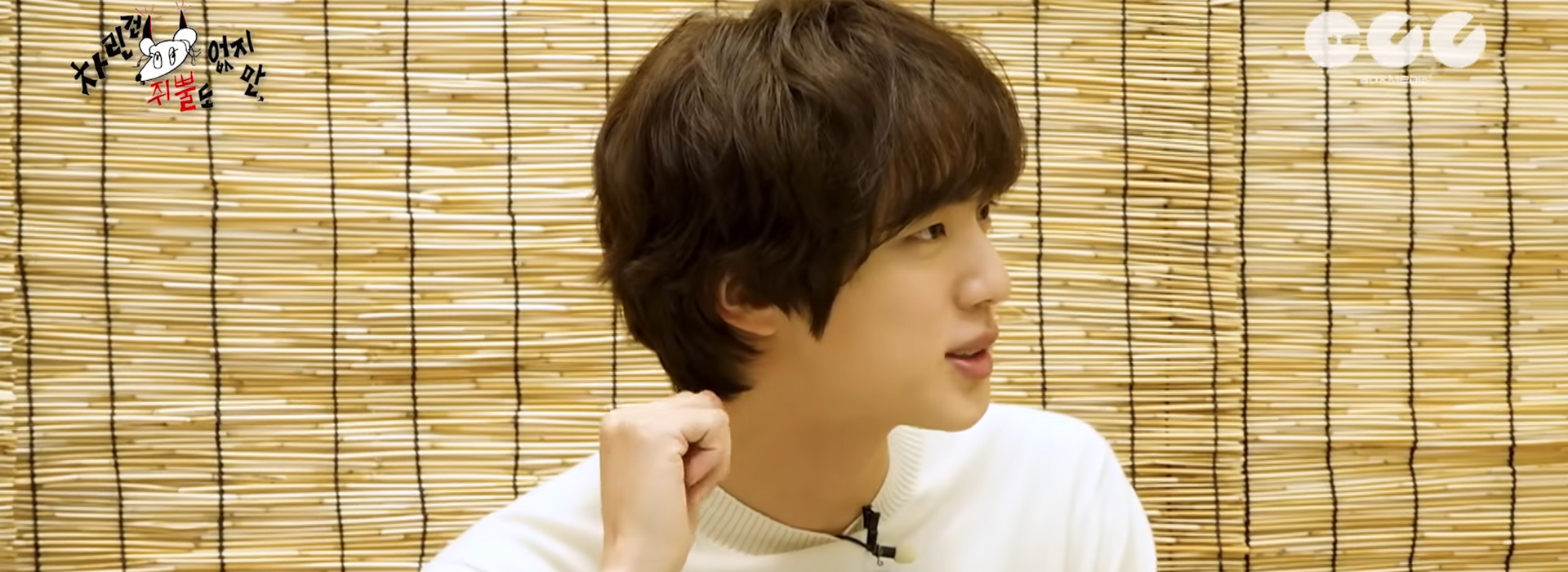
Nothing Much Prepared (EP.13)
Song Hooryeong: As soon as the door opens, they greet one another with bows then Youngji shouts “Bang-gah, bang-gah!” to which BTS Jin does not miss a beat and dishes “Hai-roo!” right back at her. From the jump it is clear this is no ordinary collaboration. After a few rounds of drinks, it’s time to call one another “dang-shin”. Lee Youngji is the host of the YouTube talk show “No Prepare,” and Jin is here for its season finale. Theirs is a slightly gruff yet familial chemistry. Bickering cousins playing card games on the kitchen table during holidays, or the class president experiencing his first intergenerational moment with a freshman. These images come to mind as Jin’s voice picks up decibels to reach Youngji’s level as the Halli Galli game commences, and when Jin proclaims that “I hope many people don’t know this song,” all the while bumping to his “SUPER TUNA” and pointing a snazzy disco finger to each major beat while Lee Youngji dances along. Later, during the following alcohol talk, Lee Youngji says to Jin “I wanted to say thank you for contributing to the development of Korean culture,” to which Jin recognizes the team effort : “It’s our members who did it, not me.” Jin reveals again his deep appreciation for BTS as a group as he explains that every member on the team gladly “concedes what he wants to do for the other members, and I think that’s why we can maintain our team.” And confiding in ARMY, he gets it off his chest saying that as he himself has the experience of deeply immersing into this feeling of admiration, he wants to hide his weakness and insecurities as much as possible. For those both familiar and unfamiliar with the true charm of this “super star,” this episode is a must-watch, rollicking ride. The final minutes could very well be called “epic,” maybe even that elusive “true ending,” “fit for the Jin.”
Remember
Im Sooyeon (CINE21 Reporter): In the end, we have failed to clear out vestiges of pro-Japanese collaboration from our society. “Remember” imagines the story of revenge by an old man in his 80s trying to correct the painful events of Korea’s modern history. Lee Sungmin plays Han Pil-joo, a man in his 80s slowly succumbing to Alzheimer’s disease. To remember the names of those he must never forget, Pil-joo tattoos the names to his body and begins to exact revenge on them in a dramatic unfolding of events which has taken more than six decades to prepare. Struggling sometimes with mobility issues, Pil-joo asks In-kyu – played by Nam Joo-hyuk – to drive for him. The two meet while working at a franchise restaurant. Pil-joo’s plans go awry from the very first kill when In-kyu gets mistaken as the prime suspect. Admittedly, “Remember” aims to be a public-friendly commercial film that follows a familiar vengeance arc. The buddy film format brings together an octogenarian and a 20-something for a revenge story in a way that effectively blends comedic elements into colorful action. A friendship is formed that transcends the generational divide and a meaningful awareness rises in In-kyu. What is interesting is that the movie is designed such that this development is not consumed as simple entertainment. Settling the debt to victims accrued by pro-Japanese collaborators is not accomplished only by illuminating that part of history. The necessary deeper message is conveyed in the intergenerational awareness represented by the unlikely friendship. This is indeed greater than the catharsis of the revenge killings because it reminds us that the past continues to this day as social stratification. The film’s fictional characters who are forced to own their past sins through Pil-joo, subtly bring to mind certain names from reality, and these moments are where we realize that “Remember” and the real Korea do not exist apart. The film is produced by Yoon Jong-bin (“Nameless Gangster : Rules of Time” (Dir.), “The Spy Gone North” (Dir.)), and directed by Lee Il-hyeong (“A Violent Prosecutor” (Dir.)).
“Not My Job” (FLO)
Randy Suh (Music Writer): The rich vocal harmonies and chord progressions, the groovy R&B beat, hard-hitting lyrics that tell us it’s not their job to give free ego boosts to feckless dudes; the British girl group trio – FLO – and new single “Not My Job,” hits us with a strong dose of nostalgia for girl groups such as TLC or Destiny’s Child. Y2K revival is sweeping across society and pop culture. Still, FLO’s work stands out. If it had been a half-baked copy of popular totems of the era, the music and style might have felt outdated, gimmicky, like a turn-off. However, the group secures the essence of that period while combining more modern production techniques to create music that feels familiar yet with unfamiliar depths listeners will love exploring. Renowned music producer MNEK was actively involved in this debut EP and his signature dry and creatively distorted rhythm patterns are front and center. The perspective of British artists curiously observing and interpreting American R&B girl groups at the turn of the century and the new millennium serves up a fascinating musical vision.
That Winter at the Sontag Hotel (Djuna)
Kim Gyeoul (writer): The winter chill has arrived early this year, and the nose is already picking up the telltale scents – festive yet somehow melancholy – of the holiday season. With the much colder air, life begins to move to a different beat and stories with a vintage patina begin to catch the eye. Snowy scenes like those in the “Harry Potter” series, or “Carol,” the classic telling of a murder in the styles of “Murder on the Orient Express” or the “Grand Budapest Hotel” are all present in “That Winter at the Sontag Hotel.” A new collection of short stories by Djuna that follows in the footsteps of traditional murder mysteries but with a subtly witty twist, reading through the collection one story at a time could be the perfect literary Advent calendar. Ranging from a good old-fashioned locked room mystery to murderous confessions, “That Winter at the Sontag Hotel” dutifully covers all mystery styles to satisfy old-time genre fans and newcomers alike. As one would expect from a master storyteller who has been a stalwart of Korean genre fiction, in spinning these captivating yarns set in Korea, Djuna shows us how deft and steady her author’s hand is.
Unauthorized reproduction and distribution prohibited.
